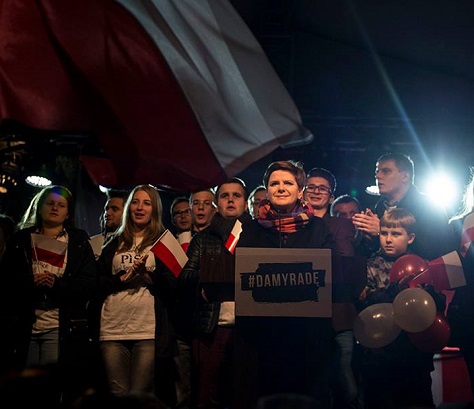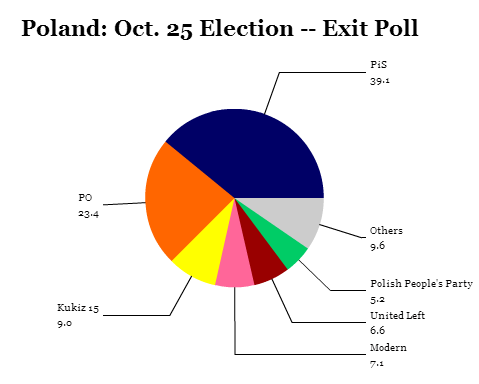
In a sweeping election, the nationalist conservative Prawo i Sprawiedliwość (PiS, Law and Justice) will return to power after eight years in the wilderness, bringing the prickly former prime minister Jarosław Kaczyński back to the heart of Polish and European governance, according to exit polls pending the release of full election results on Monday.![]()
Though Kaczyński himself didn’t stand for prime minister, he hand-picked the PiS’s prime ministerial candidate, 52-year old Beata Szydło, a more moderate figure who worked throughout the campaign to assure voters that the PiS could form a more constructive government than the one Kaczyński led between 2005 and 2007, when his late twin brother Lech Kaczyński simultaneously served as Poland’s president.
The PiS’s presidential candidate, Andrzej Duda, a 42-year-old member of the European parliament, won an upset victory in May’s presidential election. A nationalist who opposes Poland’s entry into the eurozone, Duda (like Szydło) nevertheless portrayed a more moderate quantity than Kaczyński.
Though Kaczyński hasn’t particularly undermined Duda (so far), the presidency is a far more ceremonial office than the premiership, so it’s reasonable to believe that Kaczyński will play a much more hands-on role in the next government, if behind the scenes. That means that most important question that the new government faces is whether it will embrace the more moderate Duda-Szydło approach or revert to Kaczyński’s more pugilistic and confrontational manner. (A close second is the degree to which the next government will embrace economic liberalism, given the PiS’s penchant for populism).
*****
RELATED: Polish conservatives prepare to return to power after 8 years
*****
The election results amount to a repudiation of Donald Tusk, the former Polish prime minister appointed last year as president of the European Council. Tusk hasn’t made the easiest transition from Warsaw to Brussels. Part of the reason is that he has spent so much effort trying to continue to shape Polish politics through his hand-picked successor, Ewa Kopacz, who didn’t share Tusk’s immense charisma or gravitas. His party, the more liberal, center-right Platforma Obywatelska (PO, Civic Platform), had trailed consistently since the May presidential election, despite one of the best economic records in Europe. GDP growth since the 2008-09 financial crisis is the highest in Europe, and the country actually avoided recession throughout the past eight years.
Even with Tusk at the helm, a third consecutive mandate would have been difficult. Voters voiced growing concerns over a wire-tapping scandal and exasperation with the unequal pace of economic development. Civic Platform also faced the general sense of fatigue that comes after two full four-year terms in office. Moreover, fears over border security and the European refugee crisis this autumn also played to the PiS’s more nationalist strengths.
Headlines and commentary suggest that the new Polish government will look like Viktor Orbán’s hard-right, nationalist government in Hungary, but that somewhat overstates the case. Though the PiS will echo Orbán’s line on migration and border security (essentially the same position as Slovakian prime minister Robert Fico), Orbán has expressly taunted European values and embraced the concept of an ‘iliberal’ Hungary. No one expects Poland to follow suit.
Nevertheless, the new government will be even more hawkish in pushing for European (and NATO) vigilance against Russia, and the PiS will push for Poland to take a leading role throughout eastern and central Europe on all matters, including security.
Relations with the rest of the European Union will not come quite as easily as under the Tusk-Kopacz governments, though. The PiS government will join both Orbán and British prime minister David Cameron with a far more nationalistic view toward EU reform to restore more powers to member states, especially as EU officials struggle with border security. As Cameron gears up for EU negotiations for greater British opt-outs prior to the 2017 referendum on UK membership in the European Union, Poland’s new government will provide him with a powerful eastern ally.
Continue reading Poland election results: PiS sweeps to victory
